A discourse delivered at the New Vrndavana spiritual community in West Virginia by His Divine Grace A.C. Bhaktivedanta Swami Prabhupada
munayah sadhu prsto ‘ham
bhavadbhir loka-mangalam
yat krtah Krishna-samprasno
yenatma suprasidati
“O sages, I have been justly questioned by you. Your questions are worthy because they are linked to Lord Krishna and so are of relevance to the world’s welfare. Only questions of this sort are capable of completely satisfying the self.” (Srimad-Bhagavatam, 1.2.5)
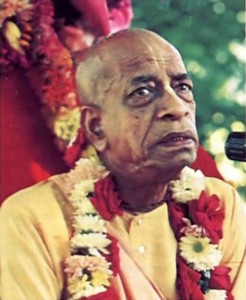 Just as we are holding a meeting here for a few days, a similar meeting was held at least four thousand years ago in a place called Naimisaranya. Naimisaranya is in India and is situated near Lucknow. The place is still existing, and if one goes to India he can visit it. Its atmosphere is very conducive to spiritual undertakings. Formerly all the great sages used to assemble in the forest at Naimisaranya, and it is said that all the demigods used to visit there. It was at Naimisaranya, at a meeting of great sages, that Srimad-Bhagavatam was discussed. Srimad-Bhagavatam was first imparted to Maharaja Pariksit by Sukadeva Gosvami. Maharaja Pariksit, who was emperor of this planet, was cursed by a brahmana to die within seven days. Although he was very wrongly cursed, Maharaja Pariksit nonetheless tolerated it. He could have counteracted such a curse, but he did not do it. Instead, he took the opportunity to retire from active life and prepare for death. He had only seven days to die, and because he was king of the earth, all the great sages and kings from all parts of the world came to see him. The problem they discussed was what to do at the time of death. Many great sages and brahmanas made numerous suggestions, telling him, “Maharaja, you simply have to do this, or do that.” Later, at the arrival of Sukadeva Gosvami, it was decided that Sukadeva Gosvami, who had recently learned Srimad-Bhagavatam from his father, Vyasadeva, could impart that knowledge to the King.
Just as we are holding a meeting here for a few days, a similar meeting was held at least four thousand years ago in a place called Naimisaranya. Naimisaranya is in India and is situated near Lucknow. The place is still existing, and if one goes to India he can visit it. Its atmosphere is very conducive to spiritual undertakings. Formerly all the great sages used to assemble in the forest at Naimisaranya, and it is said that all the demigods used to visit there. It was at Naimisaranya, at a meeting of great sages, that Srimad-Bhagavatam was discussed. Srimad-Bhagavatam was first imparted to Maharaja Pariksit by Sukadeva Gosvami. Maharaja Pariksit, who was emperor of this planet, was cursed by a brahmana to die within seven days. Although he was very wrongly cursed, Maharaja Pariksit nonetheless tolerated it. He could have counteracted such a curse, but he did not do it. Instead, he took the opportunity to retire from active life and prepare for death. He had only seven days to die, and because he was king of the earth, all the great sages and kings from all parts of the world came to see him. The problem they discussed was what to do at the time of death. Many great sages and brahmanas made numerous suggestions, telling him, “Maharaja, you simply have to do this, or do that.” Later, at the arrival of Sukadeva Gosvami, it was decided that Sukadeva Gosvami, who had recently learned Srimad-Bhagavatam from his father, Vyasadeva, could impart that knowledge to the King.
Srimad-Bhagavatam was Vyasadeva’s last contribution. It was Vyasadeva who was the original compiler of all Vedic literature. He wrote many books—the four Vedas, the 108 Upanisads, eighteen Puranas and the 1,400,000 verses of Mahabharata. These books contain hundreds of thousands of verses, and Srimad-Bhagavatam alone contains eighteen thousand verses. In this way Vyasadeva compiled so many books for the benefit of people in this Age of Kali. Unfortunately, people are not interested in these literatures. Even the people of India have lost interest, and what to speak of people of other countries. They are busy doing research, but they are neglecting the mature research already carried out by Vyasadeva. This neglect is the misfortune of India. At any rate, Vyasadeva summarized all the Vedic literatures in the Vedanta-sutra. Veda means knowledge, and anta means end; thus the ultimate goal of education and knowledge is vedanta. If one knows vedanta, he knows everything, for vedanta means ultimate knowledge. Yasmin vijnate sarvam eva vijnatam bhavanti. Yet after compiling Vedanta-sutra philosophy, Vyasadeva was not satisfied. Because he was feeling some vacancy and was sorrowful, his spiritual master, Narada, appeared before him. Narada could understand that Vyasadeva was not happy even after compiling so many great volumes of Vedic literature, and Narada addressed him as Parasarya, for Vyasadeva’s father was Parasara Muni.
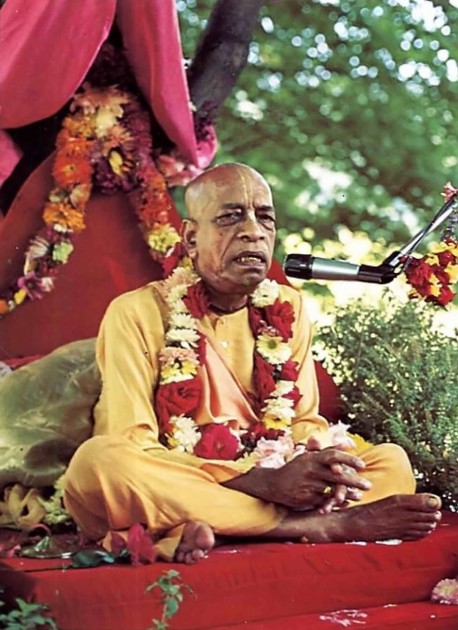
“Parasarya, why are you unhappy?” Narada asked. “You have undergone all kinds of penances, performed all Vedic rituals, written so many books—why are you unhappy?”
Vyasadeva answered, “My dear lord, what you say is right—I am unhappy. But you can find out the cause of my unhappiness.”
“You have considered so many things,” Narada Muni replied, “but you have not written anything that absolutely concerns the pastimes of the Supreme Personality of Godhead. Without discussing the Supreme Personality of Godhead, you cannot be happy.”
That is a fact. At the present moment also there is great educational advancement. There are many universities and technological institutions, and there is economic development to such an extent that in America there is sufficiency of everything. Yet people are unhappy. The youth especially are becoming disillusioned. Why? The answer is that there is no knowledge of God. This is the only cause of unhappiness. Every one of us is part and parcel of God, and because of this our real hankering is for God. A child is similarly part and parcel of his mother, and when he is unhappy, nothing can satisfy the child but the lap of his mother. Although everyone may try to pacify the child, he will go on crying and crying till he reaches his mother’s lap and is nursed by her. Similarly, we are all children of God, but we are making plans to be happy independent of God, and that is not possible.
Therefore at the present moment there is a great necessity to understand God, and for this reason the Krishna consciousness movement has started. Unfortunately, the modern leaders of India are neglecting Vedic culture and are begging technological information from Western countries. That is their misfortune. Although I am single-handedly trying to present the original Vedic culture, it can be seen that people all over the world are accepting it very happily. The government of India should have known of this necessity, but unfortunately they have no knowledge of their own culture. They have lost their own culture, and now they are begging from other cultures. In any case, this bhagavata culture is not for any particular country or nation; it is meant for everyone. God is not monopolized by anyone. He is for everyone. Krishna Himself says in Bhagavad-gita:
sarva-yonisu kaunteya
murtayah sambhavanti yah
tasam brahma mahad yonir
aham bija-pradah pita
“It should be understood that all species of life, O son of Kunti, are made possible by birth in this material nature, and that I am the seed-giving father.” (Bg. 14.4)
Universal Brotherhood.
Sarva-yonisu indicates that Krishna is the father of all species of life—of aquatics, trees, plants, insects, birds, animals and so on. In Padma Purana it is stated that there are 8,400,000 species of life, and it should be understood that all of them—whether in the air, sea or land—are sons of God. This is real universal brotherhood. We cannot think in terms of the brotherhood of all living entities because the central point is missing. The central point is God, but people are making themselves, their families, their society, their nation or even the whole human race the central point. In other words, they are trying to elevate these things to the position of God. However, these things are all imperfect. Unless we can see all living entities with an equal eye, we cannot be considered learned. As stated in Bhagavad-gita:
vidya-vinaya-sampanne
brahmane gavi hastini
suni caiva svapake ca
panditah sama-darsinah
“The humble sage, by virtue of true knowledge, sees with equal vision a learned and gentle brahmana, a cow, an elephant, a dog and a dog-eater [outcaste].” (Bg. 5.18)
Thus according to Vedic culture the gentle and sober brahmana sees everything equally. Unless one is gentle and sober, he cannot be learned. That is the test of education. A demonic man cannot really be considered educated; he must be sama-darsi. He must see all with an equal vision. There are many elevated living entities, but the learned brahmana is considered to be the topmost. Although there are many varieties of living entities, one who is pandita, learned, sees all of them on the same platform. How is this? He does not see the outward covering; he sees the soul within everyone. Having such a vision, what is his situation? This is also described in Bhagavad-gita:
brahma-bhutah prasannatma
na socati na kanksati
samah sarvesu bhutesu
mad-bhaktim labhate param
One who is thus transcendentally situated at once realizes the Supreme Brahman. He never laments nor desires to have anything; he is equally disposed to every living entity. In that state he attains pure devotional service unto Me.” (Bg. 18.54)
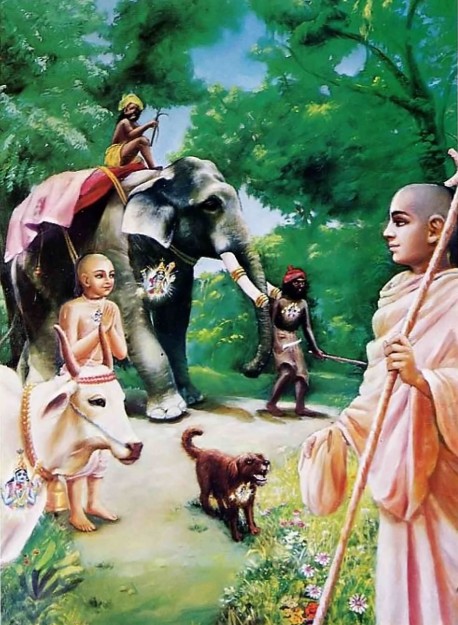
That Brahman vision is possible when one is actually in contact with Brahman, the Supreme. If the central point is missing, this is not possible. At present everyone is manufacturing his own system of knowledge, and consequently the entire world is in turmoil and confusion. Consequently, at the advent of this age of chaos, shortly after the departure of Lord Krishna from the world, the great sages assembled at Naimisaranya to discuss Srimad-Bhagavatam. Lord Krishna was present on this planet five thousand years ago, and after His departure the sages assembled, and their question was:
bruhi yogesvare krsne
brahmanye dharma-varmani
svam kastham adhunopete
dharmah kam saranam gatah
“Now that Sri Krishna, the Absolute Truth, the master of all mystic powers, has departed for His own abode, please tell us by whom religious principles are presently protected.” (Bhag. 1.1.23)
This was the main question. It is significant that Krishna is mentioned here as Yogesvara. The word yoga is very popular in the West. Generally the word yoga means mystic power, for if one actually becomes a yogi, he attains many mystic powers. A yogi who has actually attained perfection can become smaller than the smallest and can fit himself into the smallest compartment. If he is imprisoned, he has the ability to come out through the smallest hole imaginable. This is called anima-siddhi. Similarly, by laghima-siddhi, a yogi can float in the sky just like a cottonflower, and by other powers he can produce whatever he desires on the spot. There are in this way many siddhis, or perfections. Indeed, the very powerful yogis can even manufacture a planet. Visvamitra Muni, for instance, produced men from trees. Thus yoga is not simply a matter of pressing one’s nose and holding the breath; yoga is practiced by real yogis to get material power. There are many yogis who can perform such magical feats, but all of these accomplishments are quantitatively small when compared to the powers of the Lord. A yogi may be able to float himself in air, but God, by His yogic power, can float millions and trillions of planets in space. The supreme yogi is Krishna; therefore it is said, bruhi yogesvare krsne. Isvara means controller. There are many yogic powers and yogis, but Krishna is the supreme controller of all. Thus it is mentioned in this verse that the master of all mystic powers, Krishna, has left the planet.
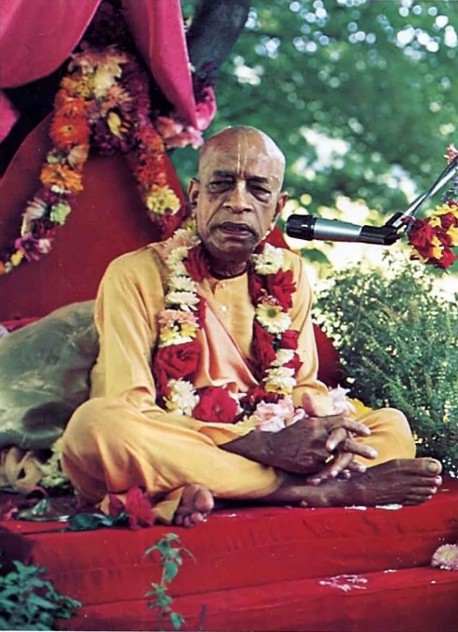
Brahmanye dharma-varmani. Dharma-varmani refers to Him who embodies religious principles. The Sanskrit word dharma actually refers to God or Krishna. Generally dharma is translated into English as religion, but this is not a perfect translation, for dharma is different from religion. Religion is usually defined in a dictionary as a kind of faith, but dharma is not really a faith. Faith can be changed. Today a man may be a Hindu, and tomorrow he may be a Moslem or Christian. Faith is not, then, actually dharma, for dharma refers to that which cannot be changed. Water is liquid and cannot be changed into a solid. One may argue that water may become solid as ice, but that is not its natural condition. That is artificial. The solidity of water as ice is temporary, and as soon as the temperature rises, the water returns to its natural condition. As liquidity is the natural state of water, similarly dharma is the natural state of the living entity.
Our Natural Position.
Since the living entity is part and parcel of God, he has a natural position. For instance, one’s finger is part and parcel of the body, and as such it has a natural position. That is, it works in accordance with the rest of the body. The finger may pick up a piece of cake, but the finger itself does not use it. It takes it to the mouth. In this way the finger serves the whole body. Similarly, dharma indicates that the living entity, being part and parcel of God, must serve Him. The attitude of service is present in every living entity, but one person is serving himself, another is serving his family, another is serving his society or country. In any case, service is there, and if one has nothing to serve, he will sometimes take on a dog or cat to serve. However, it should be noted that service to anything other than the Supreme Lord is maya, illusion. Service is actually meant for God, but because we have forgotten Him, we are rendering service to so many forms of maya. Consequently when God comes He establishes dharma. When Krishna came to this earth, He proclaimed His manifesto in Bhagavad-gita in this way:
yada yada hi dharmasya
glanir bhavati bharata
abhyutthanam adharmasya
tadatmanam srjamy aham
paritranaya sadhunam
vinasaya ca duskrtam
dharma-samsthapanarthaya
sambhavami yuge yuge
“Whenever and wherever there is a decline in religious practice, O descendant of Bharata, and a predominant rise of irreligion—at that time I descend Myself. To deliver the pious and to annihilate the miscreants, as well as to reestablish the principles of religion, I advent Myself millennium after millennium.” (Bg. 4.7-8)
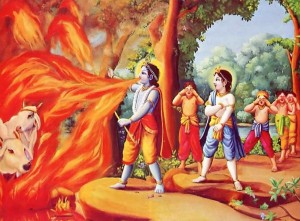
Thus Krishna came to establish real religion. Krishna sages assembled at Naimisaranya knew the mission of Krishna. They knew that He came to establish religion, and they were wondering, since Krishna was no longer on the planet, under whose care religion was entrusted. Dharmah kam saranam gatah. As long as Krishna was present, He was discharging real religion. How was that? Paritranaya sadhunam vinasaya ca duskrtam: He was killing demons and giving protection to His devotees. Since Krishna is absolute, both His killing and protecting are the same. This, then, is the main question of the sages of Naimisaranya, and it is answered first by Sukadeva Gosvami’s disciple, Suta Gosvami.
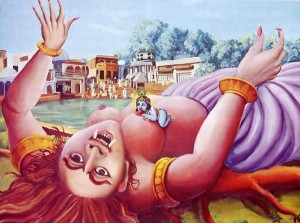
“Dear sages,” Suta Gosvami replied, “you have asked questions concerning Krishna, and these questions are very nice.” The word sadhu means very nice or perfect. Bhavadbhir loka-mangalam: “These questions,” Suta Gosvami continued, “are asked for the good fortune of the entire world, for they concern Krishna, in whom the real principles of religion abide. If we ask questions about Krishna, try to understand Him and discuss Him, our lives become perfect.”
Simply by trying to understand Krishna, one’s life can be perfect. The perfection of life means getting out of this material condition and attaining our constitutional position in our original spiritual life. Originally we are all spiritual sparks—not only we, but all other living entities as well—trees, plants, aquatics, insects, microbes and so on. Wherever we find living symptoms we should know that there is a living entity, and that that living entity is part and parcel of God. According to karma, or according to pious and impious activities, the living entity is obliged to accept a certain type of body. The acceptance of that body is in the hands of nature; science will not help. This is the verdict of Bhagavad-gita:
prakrteh kriyamanani
gunaih karmani sarvasah
ahankara-vimudhatma
kartaham iti manyate
“The bewildered spirit soul, under the influence of the three modes of material nature, thinks himself to be the doer of activities that are in actuality carried out by nature.” (Bg. 3.27)
We may theorize about so many things, and we may be great scientists, but when death comes, we cannot protect ourselves.
jatasya hi dhruvo mrtyur
dhruvam janma mrtasya ca
“For one who has taken his birth, death is certain; and for one who is dead, birth is certain.” (Bg. 2.27)
Nature’s Control.
We may be puffed up by advancement of scientific knowledge, but we must be under the control of birth, old age, disease and death. This is prakrti, nature, and nature is controlled by God. This is also stated in Bhagavad-gita:
mayadhyaksena prakrtih
suyate sacaracaram
hetunanena kaunteya
jagad viparivartate
“This material nature is working under My direction, O son of Kunti, and it is producing all moving and unmoving beings. By its rule this manifestation is created and annihilated again and again.” (Bg. 9.10)
We should not think that material nature is working independently; that is not possible. Matter cannot act independently. We may see that matter is working, but actually we are superior. Scientists may see that a molecule is working in this way or that way, but one who is seeing this activity is actually superior. Matter works under certain material laws, but in actuality the living entity is superior, and of all living entities, the supreme living entity is God. This is the verdict of the Vedas: nityo nityanam cetanas cetananam (Katha Up. 2.2.13). Nitya means eternal; God is eternal, and we are also eternal. Cetananam: God is full in knowledge, and we have some knowledge. Dull matter has no knowledge. Krishna is the supreme eternal, and He is supremely cognizant. Eko bahunam yo vidadhati kaman (Katha Up. 2.2.13). Krishna is singular, and the living entities are plural; God is one, and the living entities are many. There is no limit to the living entities. We have experience of this, for even within our room thousands and thousands of ants may come out of a small hole, and even within a drop of water there are thousands of microbes. These are all living entities under different conditions of life. Thus the living entities are many, but God is one.
What is the distinction between the plural living entities and the singular supreme living entity? It is that the supreme living entity is supplying the plural entities with all necessities. As civilized men, we have industries and businesses to solve our economic problems, but we human beings are but a small part of the many living entities. According to Padma Purana, out of 8,400,000 species of life, different types of human beings comprise only 400,000 species. Out of these, 75% are uncivilized. Aside from the small number of civilized human beings, other living entities have no problem eating, sleeping, defending and mating. We have created so-called problems by our civilization. Otherwise, there is no difficulty. Elephants eat a large quantity of food, but God is supplying it for them, and they also have sleeping arrangements and mating arrangements. The same can be said for the other species of life. An educated man should understand that if God makes such arrangements for other living entities, he makes them for man also.
In the human form of life we should try to understand what God actually is; this is our special prerogative. We should not worry that if we search after God our other problems will not be solved. By such a search, all our other problems will automatically be solved. Just as there is an arrangement for our distress, there is a similar arrangement for our happiness. No one wants distress, but why do distresses come upon us? The distresses have already been arranged, and we should know that if our distresses have been arranged, our happiness is also. We should not be disturbed by so-called distress and happiness; they are going and coming. Krishna enlightened Arjuna about this at the beginning of Bhagavad-gita:
matra-sparsas tu kaunteya
sitosna-sukha-duhkha-dah
agamapayino ‘nityas
tams titiksasva bharata
“O son of Kunti, the nonpermanent appearance of happiness and distress, and their disappearance in due course, are like the appearance and disappearance of winter and summer seasons. They arise from sense perception, O scion of Bharata, and one must learn to tolerate them without being disturbed.” (Bg. 2.14)
Neither summer nor winter remains forever; they both change. We should not bother, therefore, about so-called happiness and distress. Perfect civilization depends on the arrangements made by God, even as the lower animals depend upon them. Birds chirp in the morning, and they do not worry about how they are going to find food during the day, for they know that there is food provided and that they simply have to go get it. Our real problem is not insufficient food or sleeping arrangements. Our real problem is that we have forgotten God. We must revive our God consciousness again—it is not very difficult—and utilize our time in reestablishing our relationship with God. Our business should thus always be to inquire about Krishna, God, and try to understand Him, for as soon as we understand God, our material conditional life will be finished. This is validated by Krishna Himself in Bhagavad-gita:
janma karma ca me divyam
evam yo vetti tattvatah
tyaktva deham punar janma
naiti mam eti so ‘rjuna
“One who knows the transcendental nature of My appearance and activities does not, upon leaving the body, take his birth again in this material world, but attains My eternal abode, O Arjuna” (Bg. 4.9)
We should know Krishna in truth; we should not try to know Him by our own concoctions. We should know Him scientifically, for knowledge of God is a great science, and it is set forth by Krishna Himself in Bhagavad-gita:
jnanam te ‘ham sa-vijnanam
idam vaksyamy asesatah
yaj jnatva neha bhuyo ‘nyaj
jnatavyam avasisyate
“I shall now declare unto you in full this knowledge both phenomenal and noumenal, by knowing which there shall remain nothing further to be known.” (Bg. 7.2)
Sa-vijnanam: it is a great science. If we try to understand God, we have nothing more to understand. All knowledge is there; God is everything, and if we understand Him, we understand everything. Therefore Suta Gosvami proclaimed that the great sages’ questions about Krishna are so nice that they are auspicious for the entire world.
We have begun this Krishna consciousness movement, and it is not for our personal benefit; it is good fortune for the whole world. We should all try to inquire about Krishna and try to understand Him. Yayatma suprasidati. In this way our soul (atma) will feel satisfaction.

Leave a Reply